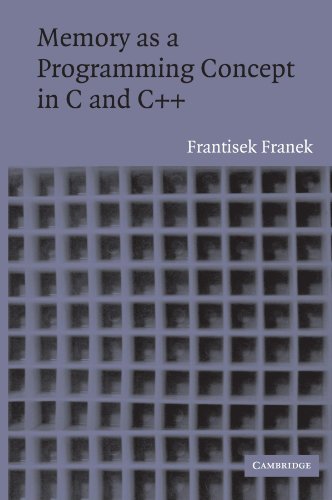Memory as a Programming Concept in C and C++ epub
Par edwards christian le mardi, juin 7 2016, 06:47 - Lien permanent
Memory as a Programming Concept in C and C++. Frantisek Franek

Memory.as.a.Programming.Concept.in.C.and.C..pdf
ISBN: 0521520436,9780521520430 | 272 pages | 7 Mb

Memory as a Programming Concept in C and C++ Frantisek Franek
Publisher: Cambridge University Press
> > “Memory as a Programming Concept in C and C++. Description: Click to see full description. This is different from the stack, as stack allocations are based on a first -in-last-out concept, such that when returning from a function data can be lost unless explicitly posted to a common “return” point. With C++11, it has become easier to start with the modern high level subset of C++ (and the standard libraries), and then gradually add on the intricacies and the low level features. C vs C++ : Embedded system, performance, size, object oriented programming, modular programming. Tune up your programming skills It's the concept of allocation of memory at the runtime, it is simply the use of “new” and “delete” operators. Product Description Assuming readers have a basic familiarity with C or C++, Frantisek Franek describes the techniques, methods and tools available to develop effective memory usage. Memory control and timing is of absolute importance, so you must have completely deterministic behavior in your system and the ability to manually manage memory. Dynamic memory allocation is a common feature of programming languages (or libraries, such as in C/C++[3]) that allow allocation of varying sized pieces of data at run-time. Embedded systems are often severely constrained in memory while still requiring high performance. This entry was posted in C / C++ by Kamran Ali. I'm quantifying language complexity by comparing the number of concepts a programmer has to understand to learn a programming language - C++, Ruby or CoffeeScript - in its entirety. Assuming readers have a basic familiarity with C or C++, Frantisek Franek describes the techniques, methods and tools available to develop effective memory usage. I will assume that you have already read the previous posts in the series, but I will also put in-line links to any important terms or concepts that you might need to know about to make sense of what you're reading. The overwhelming majority of bugs and crashes in computer programming stem from problems of memory access, allocation, or deallocation.